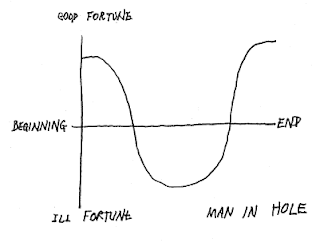Last week while having dinner with my grandparents, I got into a conversation with my grandma about her childhood in Egypt. My grandma told me about the good old days when movies were "nice," as she put it, meaning that they did not have any swearing, drugs, or sex. She said loved to go with her friends to see movies all day long, but her favorites were the American films because they always had a happy ending. Although I have seen so many movies, I never really picked up on the the fact that American stories often seem to follow a general form. In a discussion in American Studies class the other day, we talked about how movies like the Lion King and Cinderella have become family favorites because of their nearly perfect "redemptive arcs" as described in Kurt Vonnegut's essay, "Here Is a Lesson in Creative Writing." Vonnegut explains that in order for a story to do well in the American marketplace, it will follow a somewhat similar pattern: life is going pretty well, then something bad happens, but as fate would have it, life gets to be even better than it ever was. Why is it that most Americans only want to see a movie with a happy ending?
 |
| Redemptive Arc |
I think most people who go to the movies want to have a pleasant experience and want to come out feeling satisfied that the conflicts have all been resolved. A good point that someone brought up during our discussion about the "ideal" American movie is that when people walk out of a movie happy, they will spread a good word about the film. Therefore, more people will go to see the movie, making more money for its producers.
Why do you think it is that American films and stories commonly have happy ending? Is it just to sell tickets?


I agree with you that people want to leave a movie feeling good. I think that often times people go to see a movie to escape reality and to immerse themselves in a fantasy world. They go and watch these fictional characters live their fictional lives so they do not have to think about what is going on in their real world life. Maybe it is just to sell tickets, but I think it could also have just become a norm in society.
ReplyDeleteWhat could the redemptive arc tell about American society, if anything? Why has it "become a social norm"?
ReplyDeleteFor example, think about the kind of people that are the subject of popular biographical movies.
ReplyDeleteI think that good movies are not necessarily the ones that leave you feeling "good" but rather that leave you with actual feelings. My mom doesn't like it when she sees movies that are "sad" or "disturbing" but I think that those can be some of the best kinds of movies because they make you feel something, they induce emotion. Movies should not always have a happy ending because that's not reality, and life does not always end in rainbows and butterflies.
ReplyDeletejosh i believe that it is to sell tickets, as we discussed in class, but with certain movies they are also trying to apply and help you decode this moral or lesson. So the idea of a "Happy Ending" could be for the money, but it could also be for the worlds sake, of teaching people how to act or live their lives.
ReplyDeleteIf a movie ends on a disturbing note, why is it that that movie does not usually do very well in terms of profit?
ReplyDeleteI think that movies that end on a disturbing note often don't do well as well in terms of making money because it shrinks the possible audience. Most people wouldn't bring their child to a super disturbing movie because they wouldn't respond well to it. Also, there are people like Shannon's Mom who don't want to see a movie that will make them depressed when the leave the theater. There are also people who would want to see a movie that was slightly disturbing but couldn't because disturbing material could cause them to become sick, faint, or be affected in a different physical way. I think that happy endings may make more money because they appeal to a larger audience.
ReplyDelete